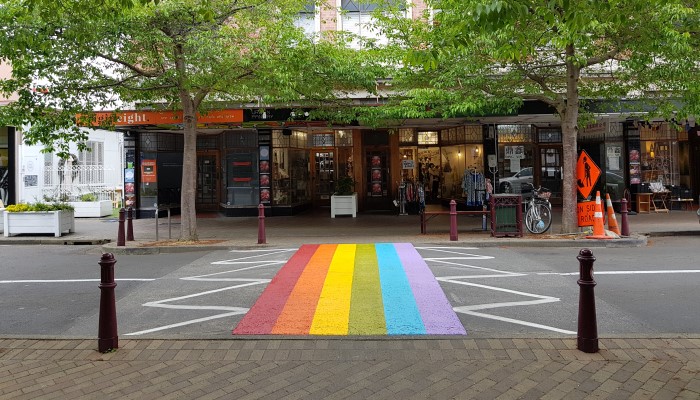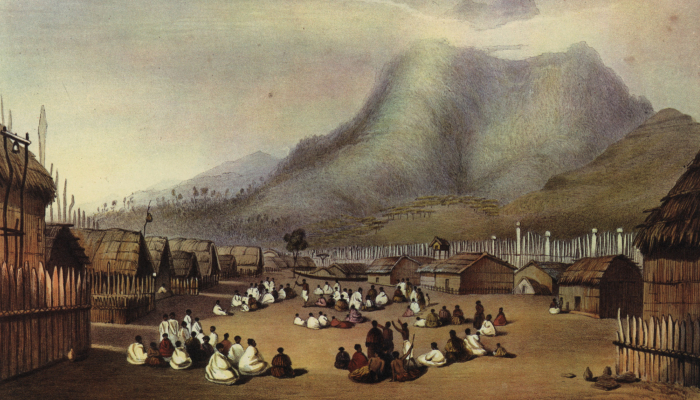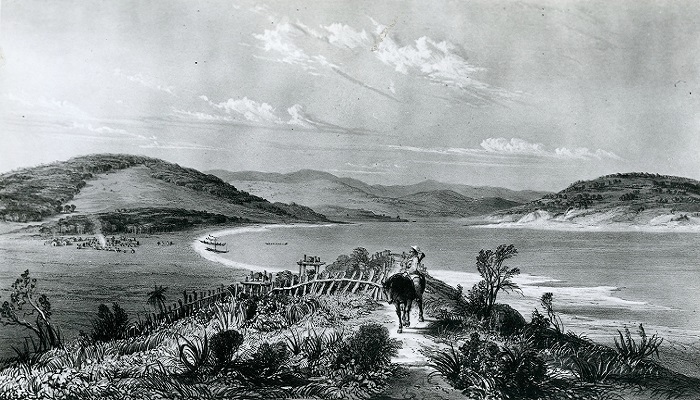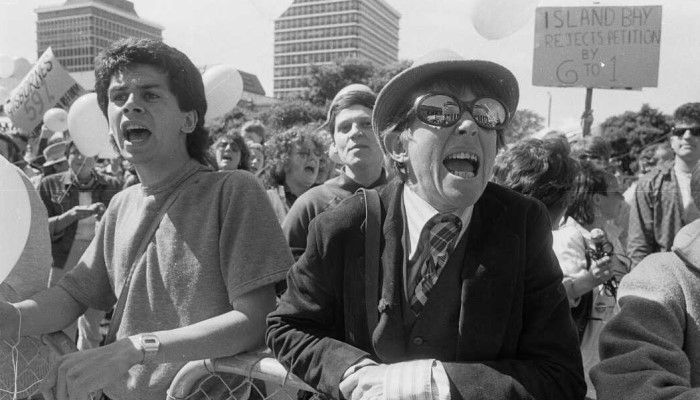LGBTQIA+ history
Where can I find information about LGBTQIA+ history?
(Years 11-13)

Image: Rainbow Cross Walk, George Street by Evan Greensides. Collection: Manawatū Heritage. On DigitalNZ.
Entry last updated: 7/07/25
Introduction
LGBTQIA+ stands for lesbian, gay, bisexual, transgender, queer or questioning, intersex, asexual (or ally) and more. The '+' signifies the ongoing acceptance and recognition of other identities. The term includes people from different gender identities, sexual orientations and expressions.
Use this entry to explore the history, meaning, struggles, and victories of the LGBTQIA+ community, including the history of gender diversity in Māori society and the impacts of colonisation.
LGBTQIA+ terms and meaning
Here are some general descriptions of gender diversity. We recommend you visit a few websites to understand what the terms mean, as they could mean different things to different people. We have some recommended reliable websites below.
Takatāpui: is a term used to embrace Māori who identify with diverse genders and sexualities.
Fa’afāfine: roughly means 'in the way of a woman'. In Samoa, these are people born male, and who are raised or identify as female. They are similar to fakaleiti, (Tonga), vaka sa lewa lewa (Fiji), fakafifine (Niue), and akava'ine (Cook Islands).
Lesbian: someone who identifies as female and is sexually or romantically attracted to someone who identifies as female.
Gay: A person who is sexually or romantically attracted to those of the same sex.
Transgender: a term used to describe people whose gender identity or expression is different from the sex they were born with.
Non-binary: describes people whose gender identity is neither male nor female.
These websites from Aotearoa New Zealand will help you understand common rainbow terms.
Te Kawa Mataaho Public Service Commission: Glossary — Diversity and inclusion, common rainbow terms, including Māori, and Pasifika terms (MVPFAFF).
Outline: Glossary of terms has general descriptions including Māori and Pacific Islands gender diversity terms.
Gender Minorites Aotearoa: Trans 101 glossary covers many rainbow community terms, Māori kupu (words) and the history of some of the terms.
Tips: Use the terms from the lists and from the glossaries as search words for your searches in the websites below, eg Takatāpui. We can always change our search words or add more if we need to.
New Zealand sites
Here are some websites from Aotearoa that cover the history of the LGBTQIA+ movement in Aotearoa New Zealand.
This organisation is a support service for social activities, peer groups, education and professional development of takatāpui in Aotearoa.
Look down the page to find What does 'takatāpui' mean? to read about its origins.
Go to Takatāpui: part of the whānau to understand the traditional meaning of takatāpui.
Growing up takatāpui: whānau journeys has information on the impacts of colonisation on gender diversity in Māori culture and society.
Use the Resources tab to find interviews with takatāpui and their whānau (family).
Use Links to find podcasts and videos about takatāpui, along with support resources and organisations such as InsideOUT.
Tips: Some websites have .au, .nz, .uk or other codes in their url. This can tell you which country this website comes from eg .au is from Australia or .nz is from New Zealand. You can check the ‘About Us’ link on the website for more information.
Te Ara: The Encyclopedia of New Zealand
Te Ara is an excellent starting point for all questions about Aotearoa New Zealand. If we look down to the bottom of the page, we can see that the website belongs to the Ministry for Culture & Heritage, so the information is well-researched and reliable.
Go to the Sitemap.
Under Section: Social Connections, find Sexuality and Reproduction.
Read Hōkakatanga – Māori sexualities about sexual diversity in Māori history and tradition.
Select Gay Men's lives and Lesbian lives to read about gay activism, gay liberation, the Civil Union Act and the Marriage Amendment Act.
The story Gender diversity has stories about defining gender identities, Māori and Pasifika gender identities and Human rights and discrimination.
Make sure to explore links from External links and resources to find more websites that support gender diversity in Aotearoa.
NZ History also belongs to the Ministry for Culture and Heritage and covers the history of people, culture, politics and wars of Aotearoa New Zealand.
Go to Politics and Government, then look under Protest and reform to read about the Homosexual law reform signed in 1986.
Also under Protest and reform find Women together.
This page has links to Lesbian organisations and Māori lesbian groups in Aotearoa.
Tips: We like sites like this because they’re reliable. You can tell because of their web address – they have either .govt or .ac, meaning they are from government or educational organisations. They’re also New Zealand sites, so relevant for us.
New Zealand's national museum located in Wellington has an online collection on a number of topics including LGBTQIA+.
Use the search box to enter the keywords 'LGBTQIA+'.
Select NZ LGBTQI+ videos, articles, and links from around the web.
From the list of contents on the left, go to LGBTQI+ histories of Aotearoa New Zealand.
You will find objects, artworks, and stories about icons like Carmen Rupe, and articles such as the Dorian Society in Wellington.
Tips: Many web pages have links to further information or to other recommended sites. Following these links is a great way to find out more.
This is the official website of the government of Aotearoa New Zealand. It has descriptions of places, spaces and landmarks in Parliament House that represent New Zealand's rich history. In 2008 the New Zealand Parliament dedicated Rainbow Room to the nation's gay, lesbian, and transgender community.
Search for 'Rainbow Room' and choose Rainbow Room.
Find the story of the Rainbow Room and interviews with famous Rainbow Members of Parliament such as Georgina Beyer, Louisa Wall and Grant Robinson.
National Library of New Zealand
Located in Wellington, the National Library of New Zealand has a wide range of services and resources to support New Zealand libraries and researchers.
Look under Use the Library to find Researchers.
Select Research Guides, then look for Queer history from the drop-down menu.
Find useful links such as the Kawe Mahara Queer Archives Aotearoa (formerly called LAGANZ) and other LGBTQ+ resources.
Archives New Zealand collects, preserves and protects official government records, documents and data of New Zealand.
Select Discover our stories at the top of the page.
Look through the stories for LGBTQIA+ illuminated.
This collection of stories is about the history of the Homosexual Law Reform, Pride events in Aotearoa and famous people like Carmen Rupe and Amy Bock.
Remember to look to the end of the page for more links to websites with information on Homosexual Law Reform in Aotearoa New Zealand.
General websites
These EPIC databases and general websites cover information on LGBTQIA+ events, history, rights and names of famous LGBTQIA+ people.
This site is from EPIC, a collection of reliable databases specially put together for New Zealand schools. It will help to answer questions like this. You may need a password from your school librarian to access it.
Use search words such as 'LGBTQ+' or 'gay rights'.
Or go to the tab called Browse Topics.
Look down the page to find LGBTQ+ Community Equality, LGBTQ+ Marriage Equality, LGBTQ+ Pride Month and Transgender Equality.
These topics cover gay marriage, gay rights, the Pride flag, events such as Pride Month, and
biographies of famous gay people.
Tips: Search words, or keywords, are the most important words in our question. You can leave out small words like ‘the’ and ‘of’ and just choose the main ones, eg gay rights. We can always change our keywords or add more if we need to.
Global Issues (Gale in Context)
Global Issues is another EPIC database. It can be used to find information on global issues, popular topics and current events.
Find Browse Topics from the top of the page, then look down the page for LGBTQ+ Rights.
This will lead you to articles, images, news, videos and more from around the world on LGBT activists, laws passed, and struggles and achievements of the LGBTQ+ community.
Tips: To get to the EPIC resources you will need a password from your school librarian first. Or you can chat with one of our AnyQuestions librarians and they will help you online. Some EPIC databases may also be available through your public library.
This is the official website of the Office of the High Commissioner for Human Rights (UN Human Rights), a leading world organisation for the promotion and protection of human rights.
Go to the tab called Topics, then look down the page to select Equality & non-discrimination.
Find a link to LGBTI people.
This page has information on the work of the UN Human Rights for LGBTI people, the latest news, publications and more.
English Heritage is a non-profit organisation that looks after historic buildings, monuments, and sites in England. Its website has a great section on events in the history of England.
Go up to the tab called Learn, then look under Histories for LGBTQ+ history.
Read LGBTQ+ stories and history from England, listen to podcasts, or read about
London's famous LGBTQ+ people.
Tips: Some websites have .au, .nz, .uk or other codes in their url. This can tell you which country this website comes from eg .uk is from United Kingdom or .nz is from New Zealand. You can check the About Us link on the website for more information.
National Museum of American History
This museum is part of the Smithsonian Institution. It collects, preserves, and displays the heritage and history of the United States.
Select Explore.
Go to Topics to find LGBTQ+ History.
Look through the collection highlights, archives, videos, exhibitions and news releases to discover
America's LGBTQ history.
Tips: A website’s address (URL) can give you a hint about how reliable it is. Look for addresses in the results that include .gov or .edu in the URL. These are quality sites from overseas government or educational organisations.
History.com is the website for the History Channel, an American television network. You may not be able to watch Live TV and some of the Shows as these need a subscription. However, you can use Topics and Stories to discover important events in history.
Enter search words such as 'gay and lesbian rights' or 'LGBTQ+ history' in the search box.
Look down the left of the page for the Table of Contents.
You will find significant events in American history such as The Stonewall Inn, LGBTQ Political Victories, and Gay Marriage Legalized.
Tips: Websites that have .com or .co in the address can have good information, but you need to assess how reliable it is. Check the About us link on the website, if you can find one. That can tell you what the company’s mission and values are.
Books
The public library or your school library is the best place to look for books on the LGBTQIA+ community. Here are a few titles to help with your search.
Honouring our ancestors : takatāpui, two-spirit and indigenous LGBTQI+ well-being by Alison Green.
30 queer lives : conversations with LGBTQIA+ New Zealanders by Matt McEvoy.
The gay rights movement by Eric Braun.
Great speeches on gay rights by James Daley.
Out here: an anthology of Takatāpui and LGBTQIA+ writers from Aotearoa by Chris Tse and Emma Barnes.
Same-sex marriage by Louise Spilsbury.
The Stonewall Riots: coming out in the streets by Gayle E. Pitman.
SCIS no: 5513502



